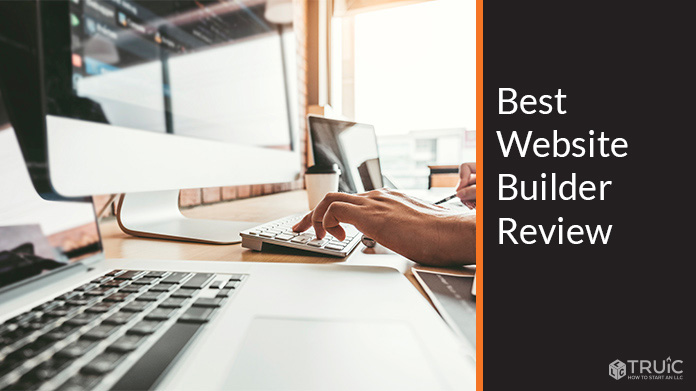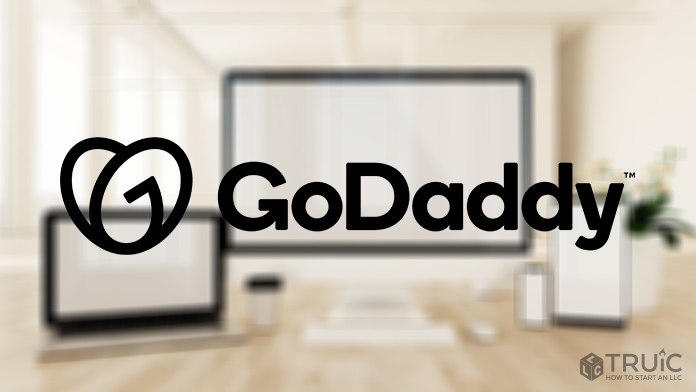Best Website Builder for Campgrounds in 2026
Building a website is one of the first and most important steps in starting a new business venture. Your website is essentially the online home of your business. It’s a place where you can showcase your products and services and freely communicate with your customers without the burdensome constraints of social media platforms.
Since you’re building a campground website, your needs will differ slightly from other websites. This guide will help you find the best campground website builder currently available and give additional recommendations to help you create the best website for your business.
Make sure you have everything you need to get started. Check out our Best Website Builder Review and How to Make a Website guides to get started on the right foot!

Best Website Builder for Campgrounds: Our Recommendation
Our #1 recommended website builder for campgrounds is GoDaddy. Its tool has made vast improvements over the past few years and has become the simplest and most intuitive drag-and-drop website builder on the market.
GoDaddy
Best overall campground website builder
- Best Template Designs
- SEO and Blogging Tools
- Unlimited Storage
- Free Trail Available Paid Plans:$12-$46/month
Using the GoDaddy Website Builder for Campground Websites
It’s important to understand what your goals are when you begin creating a website for your business. When making a campground website, the primary objectives of your site will be to:
- Connect with customers and stay in the loop
- Allow customers to book dates and check in on arrival
- Create an online home for new customers to find your business
Campgrounds can be busy one minute and quiet the next. As a campground manager, you’ll be helping customers that are checking in and monitoring the needs of others already camping. You will often be splitting your time between the front desk/office area and the campsites. By adding a chat feature to your website, and connecting it to your mobile devices, you’ll be able to stay connected with campground attendees, no matter your location.
Say a camper is heading your way but needs to check the clearance for their vehicle. Getting in touch with you can become a time-sensitive priority. The chat feature allows customers to connect with you in real-time.
Your customers may also find that they need to ask a question but don’t want to leave their campsite unattended. The chat feature can help you prioritize your campground patrols. Finding out you need something from the storeroom when you’re at the other end of the park takes time away from helping other camp customers, as well as your personal downtime.

Chat can also be a useful feature for specifically alerting campers of your needs or the park rules without needing to have a face-to-face conversation.
GoDaddy’s website builder also offers a feature for you or your customers to schedule camp dates and specific campsites on a website calendar. The appointments feature helps create customer profiles and can store important information for return campers. Storing camper info makes reservations and check-ins easier and quicker.
You can also schedule campsite service requests or other unique features, such as a welcoming package for driving campers. You’ll really impress your guests if you have a personal setup waiting on them.

Between the chat and appointments features, you will be better able to keep track of all your customers’ needs and requests, without running yourself ragged.
Getting Started With GoDaddy
One of the other major benefits of the GoDaddy website builder is the ease of getting started. When you log in to the builder for the first time, you will see a two-question form. For “Choose a category,” type in “campground” in the provided field and click “Next.” Then, on the next screen, type the name of your business.

After about 10 seconds, GoDaddy will take you to the front page of your new website.
GoDaddy’s builder uses artificial intelligence (AI) to better understand your business name and type so as to construct a template that’ll best suit your business.
Once you make it this far, it’s as simple as customizing the information on the pre-built pages to match your business, and you’ll have a semi-custom website that’s ready to be published to the web — all in less than five minutes.
Of course, depending on the level of customization that you would like to do, you can continue to add, change, and move things around until you have your dream website!
Cons of the GoDaddy Website Builder for Campground Websites
While this website builder is our recommended pick for campgrounds, it’s not totally flawless. There are a few things that may push certain users to other builders. These cons include:
- No third-party apps, add-ons, or plug-ins — As it currently stands, GoDaddy’s website builder does not support or connect with third-party apps, add-ons, or plug-ins. This is primarily because of the streamlined nature of the builder. In an effort to keep it as user-friendly as possible, GoDaddy doesn’t connect to these extensions. This may be problematic for those looking to build a website with lots of extra features. A website builder such as WordPress can accommodate these needs if you find you want a website with these additional features.
- Ecommerce may be limited — A business requiring robust online sales may find themselves limited with GoDaddy’s ecommerce features. High volume sales may need a website builder like Shopify, which specializes in ecommerce. But, for a campground, your sales may be less frequent, especially starting out. GoDaddy’s commerce feature will easily get you started and generate sales, thus giving you the time to determine if GoDaddy is the right fit.
GoDaddy Website Builder Summary
Overall, the GoDaddy Website Builder is our #1 recommendation for campground websites. the pros outweigh the cons by heeps and gobs.
Check out the GoDaddy Website Builder for yourself and get a 30% discount by using our link.
For more information on the GoDaddy Website Builder, check out these articles:
Other Website Builders for Campgrounds
Web.com
Web.com
Optional campground website builder:
- Easy to Use
- SEO and Blogging Tools
- Unlimited Storage
- Signup Offer
Like most website builders nowadays, Web.com enables users to quickly create a functional website without needing to write a single line of code. It also includes an extremely affordable signup offer for the first month, which allows for time to learn the platform before having to truly pay for it. As one of the first website builders available on the internet, it has also perfected the art of drag-and-drop functionality and includes fast uptimes, allowing your site to be better optimized for search engines.
The problem is that Web.com hasn’t entirely updated with the times. Its templates feel a bit outdated, and there are moments when using the editing tool feels a little less intuitive than it does on more modern platforms like GoDaddy, Wix, or Squarespace. Additionally, despite the low cost of premium plans at signup, these prices skyrocket after the first monthly billing cycle. This may make it seem like an affordable option, but in practice that might not shake out to be true.
WordPress
WordPress
Optional campground website builder:
- Highly Customizable
- Popular
- Unlimited Storage
- Inexpensive
WordPress is one of the most popular website builders on the market, and with good reason. This content management system (CMS) is highly customizable, endlessly flexible, and can be one of the least expensive options available to small business owners. WordPress consistently ranks as one of the best website builders in the world, and it can be a good choice for your business website.
However, WordPress does have its drawbacks. Site owners must purchase their own domain name and hosting package, and they also have to perform routine maintenance tasks like updating their website and plugins and conducting site backups. In addition, WordPress is not an easy-to-use builder, especially when compared to other recommended options like GoDaddy, Wix, or Web.com. Typically, we only recommend WordPress to business owners who already have experience with the builder or are more tech-savvy.
Wix
Wix
Optional campground website builder:
- Modern Templates
- Popular
- Unlimited Storage
- Free Plan Available
Wix consistently ranks high in our list of best website builders, and it’s easy to see why. Having been around for a while, Wix has updated well with the times and remains a very sleek, modern platform where users can create a high-performance website without having to spend too much time learning about web design. Its templates feature beautiful designs, and there are many customization options available — as well as a (very limited) free plan for users looking to save some money.
Despite all of this, some of these added features come with an extra layer of complexity. Using Wix’s editor is simply not as easy and intuitive as some of its competitors. Wix also lags behind when it comes to analytics and other basic metrics a small business owner will need to keep track of growth. Finally, despite offering a free plan, there are a lot of features missing from it — like a Wix subdomain — and Wix premium plans run a bit steeper than the likes of GoDaddy and Web.com.
How to Choose a Website Builder for Campgrounds
Choosing a website builder is one of the most important decisions you will make when it comes to building your campground website. If none of the suggestions above seem like they will fit your needs, then you’ll need to select a different builder. This section will give you a framework to make the decision in the most effective way possible.
Once you have an idea and guidelines of how you will make this choice, check out our Best Website Builder of 2026 review for several different options and reviews of each builder.
Ease of Use
The most important factor when choosing a website builder is its ease of use. It doesn’t matter how many bells and whistles or beautiful templates the builder has if you can’t figure out how to use it.
Of course, all builders will have a learning curve. But, some are just considerably simpler than others. WordPress, for example, is an absolutely amazing tool that gives you almost limitless flexibility but is one of the least intuitive builders on the market.
Most small businesses that use WordPress end up hiring developers and marketers to create and manage their websites. This is not a bad thing, per se, but it’s a decision you will have to make. After all, you know your business (and its needs) best.
Speed of Implementation
Similar to ease of use, speed of implementation is an important factor when starting a new site from scratch. When beginning a new business, you will have a massive number of tasks that need to be taken care of in order to get things going. Creating a website is absolutely one of the most important.
With this being said, it obviously makes more sense to use a tool that can have you up and running quickly. Some builders are better suited than others when it comes to a new site.
Some give you a blank slate to work from, others give you templates, and others still use AI to understand your unique needs and help to fill in some of the blanks for you. The right answer for you may be different than for someone else, but understanding this will give you a massive advantage when selecting your builder.
Expandability
Expandability is less about what you want to do with your website now and more about what your long-term ambitions are.
For example, let’s say that you are starting a basic website that helps your customers find where your business is and gives them multiple ways to contact you. Two years from now, you know that you want to have a full-blown software-as-a-service (SaaS) app on your website. There’s a good chance that the tools you need are going to be very different between now and then.
Something to note is that using one system doesn’t mean that you can never change platforms. That being said, migrating a site from one tool to another is usually a pretty in-depth undertaking and at least a medium-sized headache.
In the beginning, try to look forward and plan into the future for what your needs will be at different stages of your business. This will give you the insight you need to make the best decisions possible.
Additional Factors
Along with the three that we have mentioned, there are other factors that may guide your choice of website builder:
- Price — Naturally, price is a factor when choosing a website tool. If you’re starting a small blog, there’s no reason that you would need a major ecommerce suite. Keep in mind, however, that your business will be supporting this website, and hopefully, your revenue will make these $10 to $30 per month expenses look like a drop in the bucket.
- Templates — Good web design can be tricky. Do you know exactly what should go on your homepage? Having a large library of templates gives you a running start when it comes to designing the pages that will make up your website.
- Responsive Design — For the most part, all builders nowadays should have this figured out for you, but keep in mind that if your website doesn’t look good on all screen sizes (e.g., mobile, desktop, tablet, etc.), you’ll alienate a large number of your customers. Have you ever backed out of a website because it looked terrible on your phone? That is what you want to avoid for your own website.
Final Thoughts
The ease of design and execution for GoDaddy’s builder makes it an excellent choice for a business needing a capable website without needing a tech guru to design it. You will quickly be able to get your website up and running and offer your customers great choices for campground information, streamlined communications, and detailed scheduling options.
Check out our full GoDaddy Website Builder Review for more details and our Best Website Builder of 2026 guide to see how it stacks up against the other builders.


